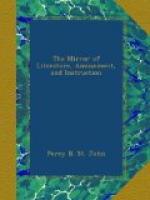29 Henry 8th. Mem. left in the keeping of the wardens nowe beinge, a fryers cote of russet, and a kyrtle of a worstyde weltyd with red cloth, a mouren’s cote of buckram, and 4 morres dawnsars cotes of white fustian spangelyd, and two gryne saten cotes, and a dysardd’s cote of cotton, and 6 payre of garters with bells.”
Having given so many items of the Robin Hood games, it will not be out of place to furnish some account of the Morrice.
The tabor and pipe strike up a morrice.—A shout within.
A lord, a lord, a lord, who!
ENTER THE MORRICE—They sing.
Skip it, and trip it, nimbly, nimbly,
Tickle it, tickle it, lustily,
Strike up the tabor, for the wenches favour,
Tickle it, tickle it, lustily.
Let us be seen on Hygale Greene,
To dance for the honour of
Holloway,
Since we are come hither, let’s
spare for no leather,
To dance for the honour of
Holloway.
Ed. Well said, my boys, I must have my lord’s livery; what is’t, a maypole? troth, ’twere a good body for a courtier’s impreza, if it had but this life—Frustra storescit. Hold, cousin, hold.
(He gives the fool money.)
Fool. Thanks, cousin, when the lord my father’s audit comes, we’ll repay you again, your benevolence too, sir.
Mam. What! a lord’s son become a beggar!
Fool. Why not, when beggars are become lord’s sons. Come, ’tis but a trifle.
Mam. Oh, sir, many a small make a great.
Fool. No, sir, a few great make a many small. Come, my lords, poor and needy hath no law.
Ed. Nor necessity no right. Drum, down with them into the cellar. Rest content, rest content, one bout more, and then away.
Fool. Spoke like a true heart; I kiss thy foot, sweet knight.
(The Morrice sing and dance, and exeunt.)
SWAINE.
* * * * *
THE SELECTOR; AND LITERARY NOTICES OF NEW WORKS.
* * * * *
SITTING IN THE DRUID’S CHAIR.
We detach the following scene from one of Mr. Horace Smith’s Tales of the Early Ages. The date is the fifth century, about twenty years after the final withdrawing of the Romans from Britain. The actors are Hengist, the Saxon chief, Guinessa, his daughter, betrothed to Oscar, a young prince, and Gryffhod, a Briton of some distinction, and proprietor of Caer-Broc, a villa on the Kentish coast, where the parties are sojourning. The incident embodies the superstition of sitting in the Druid’s Chair, similar in its portentous moment to sitting in St. Michael’s Chair, in Cornwall. It is told with considerable force and picturesque beauty.




